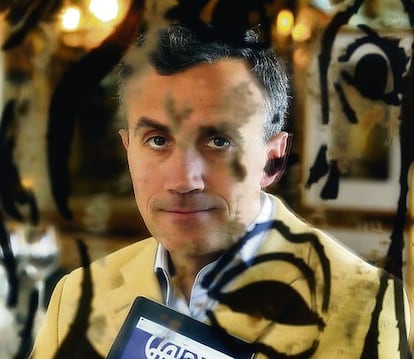“I wanted to be Starsky or Hutch”
Carlos Fernández has made the police’s Twitter account the most-followed of its type worldwide

Everyone in the office wears a uniform except for him, but that does not make him feel left out. On the contrary, Carlos Fernández Guerra loves working with the police.
"It's a great job," he says. "They have the privilege of being able to help people. When I'm walking down the street with them, I am amazed at the amount of things that people ask them, as though they had the ability to know everything and fix everything!"
Some of those questions reach Fernández as well, through the Twitter account he has been managing for the National Police (@policia) since March 2009. On Saturday, the Spanish police beat the FBI as the law enforcement agency with the largest number of followers on the social network: 743,000 versus 732,000.
"There is no secret to it," says Fernández Guerra. "It's all about being truly useful to citizens."
It sounds easy for the man who says he spends 17 hours a day online and never fails to take a call. "If you really want to be a public service, then you can't close at night. And I try to make sure that the account is run by the smallest number of people possible, so as not to lose coherence. Twitter users don't like to be talked to by institutions, but by people," he explains.
"I no longer know how one could live without a cellphone or a tablet in your hand," he adds, without sounding sorry even though he is not a native son of the digital world. "A lot of people act surprised when they see me, because they think I must be in my twenties by the way I handle Twitter. But no, I am 40."
They didn't even bother boxing my ears because I preemptively proclaimed myself an idiot"
He may no longer be 20, but he preserves a youthful enthusiasm that occasionally takes him too far. Last month, for instance, he got himself into trouble over the following exchange: a user inquired about the best place to carry joints while traveling abroad. @policia replied that it is best to carry them all rolled up where the dogs will not detect them, at the risk of being fined for drug consumption. Carlos quickly issued a second tweet to nuance the first, but it was too late.
"It was a tremendous blunder, I couldn't sleep for three nights thinking about it. It wasn't so much about what could happen to me, but about how this could hurt the agency's image," he recalls. "I knew my boss must be thinking 'This lad is daft.' And he would have been right. They didn't even bother boxing my ears because I preemptively proclaimed myself an idiot."
Even though his own blunders make him lose sleep, Fernández takes it in stride: "You gotta risk something to win something. I have tried to adopt a familiar tone, using the language of Twitter, and it's true that occasionally this has caused us some trouble. But in exchange for that we have managed to get close to people."
The results, he says, are there for all to see. "We have managed to find individuals who were wanted by the police thanks to citizen cooperation; we also issue alerts about common frauds and everyday crimes; we pick apart popular hoaxes, we provide advice... that's being useful."
But if Fernández did ever get the chance to wear a uniform, what kind of a police officer would he like to be?
"I always wanted to be like Starsky and Hutch. Who wouldn't? I admire professionals like the heroes of Orzán [three police officers who died while trying to save a drowning youngster in 2012], who are willing to give their lives to help someone. It's true there are people who consider the police the enemy, but most of us feel the opposite way. Proof of it is the low percentage of people who send us negative tweets. I always like to say that 'the police is cool, and you know it'."
Tu suscripción se está usando en otro dispositivo
¿Quieres añadir otro usuario a tu suscripción?
Si continúas leyendo en este dispositivo, no se podrá leer en el otro.
FlechaTu suscripción se está usando en otro dispositivo y solo puedes acceder a EL PAÍS desde un dispositivo a la vez.
Si quieres compartir tu cuenta, cambia tu suscripción a la modalidad Premium, así podrás añadir otro usuario. Cada uno accederá con su propia cuenta de email, lo que os permitirá personalizar vuestra experiencia en EL PAÍS.
¿Tienes una suscripción de empresa? Accede aquí para contratar más cuentas.
En el caso de no saber quién está usando tu cuenta, te recomendamos cambiar tu contraseña aquí.
Si decides continuar compartiendo tu cuenta, este mensaje se mostrará en tu dispositivo y en el de la otra persona que está usando tu cuenta de forma indefinida, afectando a tu experiencia de lectura. Puedes consultar aquí los términos y condiciones de la suscripción digital.









































